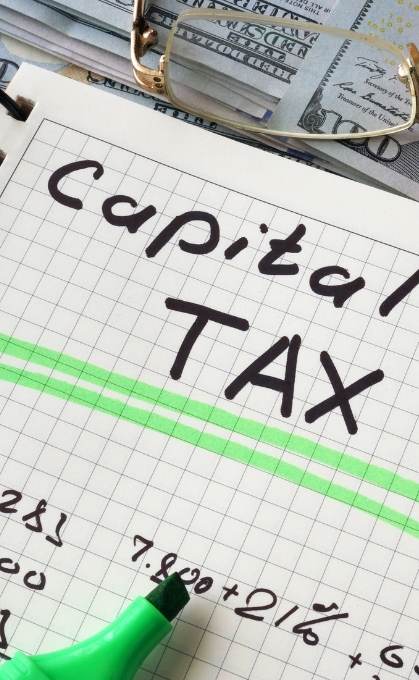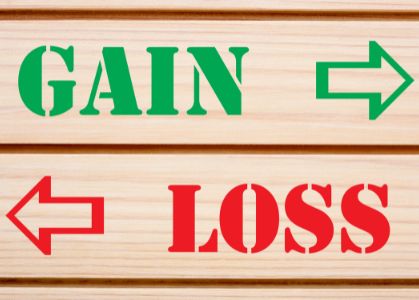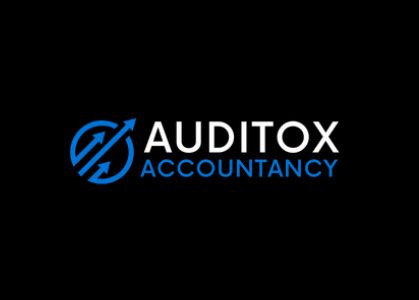- Home
- What are we
- Who we help
-
- How we help
-
-
-
- Accounting
-
- Advisory
-
- Business Support
-
-
- Resources
We wear many hats here at Auditox Accountancy, but one of our least discussed ones so far is that of our capital gains tax accountants.
If you're unsure what capital gains tax is, or if it applies to you and your business, don't worry, we'll be touching on that below.
For now, what's important for you to know is that as capital gains tax specialists we are excellent at understanding capital gains tax and providing you with the capital gains tax advice you need to A) comply with HMRC's expectations, and B) lessen the capital gains tax bill you'll pay.
How? Join us below and we'll explain everything we do here as capital gains tax accountants!

Capital gains tax is a special tax that you'll pay only when you sell, or dispose of, an asset that's increased in value since you first owned it and is therefore making you a profit.
Capital gains tax bills can be substantial, but that's usually because the everyday person or business that comes across capital gains tax ends up paying far too much tax because they're unfamiliar with the perfectly legitimate routes you can take to reduce the capital gains tax you pay.
But before we talk more about that, let's look at the business assets and personal assets that are open to capital gains tax liability.
You'll be liable to pay capital gains tax if you sell/dispose of the following and make a profit:
There may be other capital gains tax liabilities you'll need to be aware of, but we can advise you further about whether such disposals require you to pay tax. Above is simply a list of the most common chargeable assets/capital assets that you may come across in your personal life or investment business activities. Other assets may also count as a capital gain.
In our experience, we find that the most sought after capital gains tax advice from our capital gains tax accountants usually surrounds shares and property, and it's true that shares is the more complex when it comes to capital gains tax issues and working out how much you'll have to pay.
Your personal tax band influences how you're charged on the shares you sell, and typically capital gains tax is charged at either 10% or 20% in these circumstances.
You won't have to pay capital gains tax if your shares are part of your pension or held in an ISA. Besides those exceptions, though, capital gains tax (CGT) is usually payable to HMRC with your self-assessment tax return.
Shares and capital gains tax is a very complex area, and we're able to give you the most up-top-date capital gains tax advice in these scenarios.
One reason it's so complicated is that HMRC have strict rules about the disposal of shares, because they must be done so in the same order in which you acquired them in order to work out your CGT liability and to ensure the capital gains tax paid is correct.
This can be complex, but our chartered accountants and qualified tax advisors can support you with this quickly and easily.
Another key area where our capital gains tax service and tax tips are required is to do with property. This area is less confusing for individuals and businesses because plenty of people know that capital gains tax is something you'll need to pay on property for tax purposes, given how much profit one usually makes when selling properties.
The main way in which we here at Auditox Accountancy can support with capital gains tax and property is showing you how to offset capital gains tax. When you handle disposals effectively in a certain way, you can lessen your capital gains tax liability and ultimately pay less tax back when filing your self-assessment tax return or reporting directly to HMRC.
We can also support with potential tax reliefs that may apply to you. See our later section 'Different Types of Capital Gains Relief Explained' for some more information.

So, we've covered what capital gains tax is and your CGT liability and when you'll be expected to pay CGT with regards to shares and property, but what else can our chartered accountants and capital gains tax specialists and tax advisors do to help? Well, we deal in many areas:
As you can see, we offer a range of capital gains tax services and expert tax advice, but one area most people want to know about right away is the capital gains annual tax free allowance, and what this annual exempt amount is and how an annual allowance exemption can help them...

The current personal capital gains annual tax free allowance is £12,300 for the 2022-2023 tax year. That means you have a yearly tax free allowance of £12,300 when you make a capital gain - so you won't pay tax on anything so long as the profits made fall below £12,300. This annual exemption renews each tax year too.
In some instances, married couples can pool their allowances too. We can advise you more about this moving forward if it's relevant to you.

If you don't pay any tax up to a capital gain of £12,300, then it follows that after that threshold, you will have tax levied on the profit over that amount. But what is the capital gains tax rate?
Capital gains tax rates currently stand at:
Please note: The amount of taxable income you make each year on your self-assessment tax return (less your Personal Allowance and any tax reliefs) also impact the rate you'll pay as a basic rate taxpayer. In some circumstances, you may pay more if the profit you make nudges you into the high rate band. We can advise you further in these circumstances to ensure you pay only what you need to.

After all of that, let's get down to the crux of why you're here today. We offer great capital gains tax services as specialist accountants and tax advisors, but who do we work with most when supporting with capital gains tax?
Usually, individuals come to us for capital gains tax support when they're selling personal property, shares, a second property, or where they have come into property accidentally, either via inherited properties or marriage.
Since many individuals aren't versed in capital gains tax and chargeable assets, we're able to talk them through their best options when selling these assets, so they can reduce their tax burden.
When businesses are restructuring or selling their assets, we are often called in to help. Business assets are not immune to capital costs, but we can help reduce the tax liability again.
Typically, businesses need our support when selling land and buildings, fixtures and fittings, shares, trademarks, and machines - all of which a business won't be used to selling when in operation. With our support, they can pay the right amount of capital gains tax (CGT), without overspending.
By far, our most frequent clients are landlords and property investors, and for good reason. They literally deal in property for a living, so capital gains tax is par for the course.
However, just because it's part of what landlords and investors do each day, doesn't mean they're doing it 100% efficiently. With our support, we can not only help you apply for relevant tax reliefs where appropriate, but we can also help you set up your business in the most tax efficient way with our top tax tips from our tax advisors. That means you'll save more money from the get-go.

Finally, the bit you've all been waiting for: our section on tax relief. Whilst we won't cover every tax relief out there today, we will touch on the main ones that may be relevant to you.
After corresponding with you (we offer an initial free consultation and quote), we'll be able to provide you with further information about the reliefs that may apply to you.
Private residence relief (or PRR) is available when you're renting out a property that was once your primary residence. It's available for the amount of time that you lived in the property, plus a 9 month grace period up to when you sold it.
When applied correctly, this relief can have a significant impact on the total tax bill you'll pay when selling this property.
Lettings relief currently only applies to disabled persons, or those in a care home or shared accommodation with a tenant.
Although restrictive in who it applies to, the relief is generous: up to £40,000 per person, per property. That means if you have parents who are now in long-term care who have been forced to sell their property as a result, there could be as much as an £80,000 tax relief.
We can advise on these circumstances to make sure capital gains tax paid doesn't exceed what it needs to.
The current Business Asset Disposal Relief reduces the amount of tax paid when a business is sold - or a part of it is.
Rather than paying a higher rate of capital gains tax, this can be reduced to just 10% - the same as a basic rate taxpayer.
This relief is something you can apply for up to 3 years after the business closed and all assets were disposed of. If all assets weren't disposed of within 3 years, then this relief can't be granted.
To qualify, you must have been the sole trader or business partner of the closed business for at least two years before it was sold.
If shares are involved in the sale of the business, then this relief can also apply - but the circumstances are more nuanced.
In order to determine if you are eligible for Business Asset Disposal Relief, contact us today and we can better advise after hearing about your individual circumstances.
As a UK resident selling an overseas property, you will be required to pay capital gains tax in this country. However, in certain circumstances, you may also be required to pay capital gains tax in the country that you sold the property, too.
It is sometimes possible to claim additional relief due to the increased burden. By looking at your individual circumstances, we may be able to help you reduce your final tax bill.

There are two main ways you'll need to report your capital gains to HMRC, and we can support with both of these.
If you sell any UK residential property and make a gain, you must report this to HMRC within 30 days of the completed sale, and the balance of the tax bill must be paid in full within this period, too. You will need to create a Capital Gains Tax on UK Property Account with HMRC to report the gain and pay the bill. We can support here.
For UK residents making a gain from non-residential disposals, you'll simply need to report it in your self-assessment tax return when filing for the tax year in which the sale was made. We offer self-assessment tax return services anyway, so can further support when you need to report capital gains, too.

If you make a net loss on a chargeable asset, then you should still report this to HMRC. Why? Because any capital gains losses you make will reduce the capital gains tax bill you must pay overall.
It's also possible to delay your loss for up to four years to go against future capital gains tax bills, which means you can lessen the burden later on if you aren't expected to make much capital gains profit anyway in the year you make your loss.
Again, we can discuss your best options with you.

There are special rules and circumstances that impacts how HMRC deals with capital gains tax. If any of the following applies to you and the capital gain you've made, then consulting with us is your best option to ensure you meet HMRC's requirements and you pay the correct amount of CGT:
There are other special circumstances where advice from a capital gains tax accountant could help you. If you're concerned, we can help.

Even if your circumstances aren't unique, it still makes sense to work with our capital gains tax accountants here at Auditox Accountancy, because we deal with capital gains all the time.
Typically, as individuals or businesses making capital gains, you won't have experienced it before. And even as landlords and property investors, there's still a lot you could learn from our accountancy team.
So, if you need support with anything pertaining to capital gains tax, reach out today. We'll be delighted to see how we can help you.
